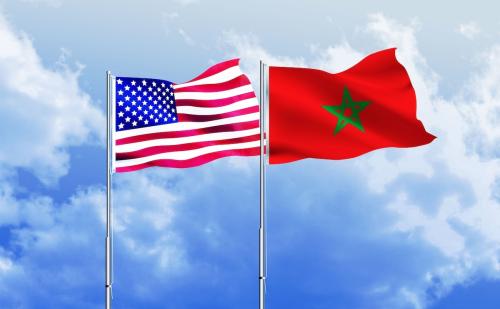Saddam Hussein’s decision this week to allow United Nations weapons inspectors to return to Iraq has once again wrong-footed those trying to end his rule.
Given the increasingly credible threat of force and Mr Hussein’s long record of pushing confrontation to the brink and then backing down at the last minute, it is not surprising that he accepted the return of inspectors. The timing of Iraq’s agreement, however, has caught his opponents off guard. In effect, Baghdad has said “yes” to a relatively weak three-year-old set of inspections arrangements before the US managed to win UN Security Council support for a tougher new set that would be explicitly linked to the threat of force.
European leaders and publics, desperate to avoid what until recently seemed like an inevitable war with Iraq, have been quick to welcome the news from Baghdad as a sign that war can be averted. Dominique de Villepin, French foreign minister, said that “we must take Saddam Hussein at his word”, and immediately called for inspectors to be sent to Iraq. Meanwhile, the Russians have begun to argue that there is no longer a need for new Security Council resolutions. To assume that Iraq’s offer of co-operation means it will now abandon its weapons of mass destruction programmes, however, would be a massive leap of faith not justified by recent experience of Mr Hussein’s regime.
If UN inspectors do return to Iraq under current inspections arrangements, what is likely to happen? If the past is anything to go by, after a few weeks or months of apparent co-operation Iraq will announce that certain “sensitive sites” are off- limits to inspectors, quibble with the make-up of one of the inspections teams or claim to be unable to find a handful of weapons scientists that UN officials want to interview.
Mr Hussein will have a much stronger hand to play in future than now, since it will be difficult to make a casus belli out of denied access to a presidential palace or a handful of missing scientists. Furthermore, the international community will begin to lose interest in the issue much more quickly than Iraq will.
An alternative scenario is equally plausible: that after those first few months of co-operation, the inspectors will have found little and the international community will begin to clamour for a lifting of sanctions on Iraq. That would mean giving Mr Hussein back his chequebook, knowing that Iraq would soon return to the weapons-of-mass-destruction business, this time with tens of billions of dollars of oil revenues at its disposal.
Some Americans will argue that the only way to avoid such scenarios is to avoid going down the inspections route in the first place. This means rejecting the offer of inspections as insufficient and proceeding with plans to change the Iraqi regime by force. Indeed, Donald Rumsfeld, US defence secretary, this week told Congress that Mr Hussein was a clear and present danger to the US, and strongly questioned whether inspections could stop Iraq’s persuit of nuclear, chemical and biological weapons.
Many Europeans, on the other hand—anxious to avoid further confrontation with Iraq—will be all too eager to compromise on the inspections regime, in effect leaving Mr Hussein’s development of weapons of mass destruction programmes in place.
A better approach to either war or complacency would be to give inspections a chance—but only under a tightened inspections regime that includes stronger, long-term guarantees. This means not allowing the Iraqi inspections ploy to derail efforts at the Security Council to craft a new inspections regime and instead to pass a tough, new resolution.
The new resolution would include stringent requirements underpinned by the threat of UN authorisation to apply force if Iraq failed to comply fully with any of the various elements.
Under the new resolution, Iraq would have to comply with all UN disarmament demands and other requirements imposed on it after the Gulf war, including—but hardly limited to—the immediate return of UN inspectors.
Those inspectors would not be impeded from visiting any potential weapons sites, including presidential palaces and compounds, at any time and without notice. Nor could they be impeded from access to any Iraqis they chose to converse with, or from determining the composition of their inspection teams as they saw fit.
The UN would have the power immediately to grant asylum to any Iraqi weapons experts as well as their families, should such experts provide it with information that could put their lives at risk.
Iraq would have to account for, display and allow UN destruction of stocks of chemical and biological weapons and munitions that it is already known to possess—and would have to do so within a short, specific time period.
The regime would have to agree to intrusive, long-term monitoring of its weapons capabilities that would include no-notice inspections. Iraq’s future oil revenues would have to continue to be escrowed, to control its purchases of dual-use equipment.
An additional but essential component of the ultimatum would concern Iraq’s neighbours. Since they would all prefer to avoid a US invasion of Iraq, they would need to agree to stop their illicit trade with Iraq—by which oil leaves the country and many goods, including weapons and dual-use technology, enter. This would require detailed negotiations with Jordan, Turkey, Syria and perhaps even Iran, including some combination of economic incentives and strong pressure that would depend in its details on the country in question. Without tighter sanctions, weapons disarmament and inspections efforts will be far less effective.
Many Americans resist such an approach because Iraqi compliance would mean allowing Mr Hussein to remain in power, at least for now. Some Europeans are also uncomfortable with it because it would mean keeping the credible threat of military force alive. All must realise that using a threat of war to bring about effective disarmament is better than a new war in the Middle East or an ineffective inspections regime that leaves Mr Hussein un- constrained.
The Brookings Institution is committed to quality, independence, and impact.
We are supported by a diverse array of funders. In line with our values and policies, each Brookings publication represents the sole views of its author(s).



Commentary
Op-edWeapons Checks Backed by Threats
September 20, 2002